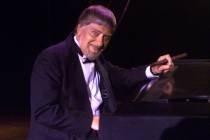Theaters showing digital broadcast of Rat Pack-era ‘Rigoletto’
Vegas Verdi? Has a nice ring to it.
Make that a ring-a-ding-ding ring — one that opera lovers will experience Saturday when the Metropolitan Opera’s “The Met: Live in HD” presents its first digital broadcast of Giuseppe Verdi’s “Rigoletto.”
But not just any “Rigoletto.”
This version shifts Verdi’s beloved 1851 opera (based on a Victor Hugo play) from Renaissance Italy to Rat Pack-era Las Vegas, complete with neon-glow lights, sequined showgirls and fin-tailed Cadillacs.
But never fear — all the “decadence, sex, power, money, gambling, violence and crime” remain intact, promises director Michael Mayer.
A Tony-winner for “Spring Awakening” and a consulting producer and director for NBC’s Broadway-themed series “Smash,” Mayer makes his Met (and opera) debut with this Rat Pack-era “Rigoletto.”
It’s set circa 1960, when the “Summit at the Sands” — and the simultaneous filming of “Ocean’s Eleven” — made Frank Sinatra, Dean Martin, Sammy Davis Jr., Peter Lawford and Joey Bishop the coolest cats in the showbiz universe.
For the Met, it’s a “400-year leap of faith,” general manager Peter Gelb says. “It has to work in terms of plot from the very first note to the last.”
And, in Mayer’s view, it does.
“We’re not touching the music and we’re not touching the story,” the director says, explaining that he wanted this production to “feel contemporary,” with “American cultural iconography” that would match “Rigoletto’s” storyline.
Traditionally, “Rigoletto” takes place in 16th-century Mantua, where a debauched duke is always on the lookout for new amorous conquests.
In this new “Vegas” version, however, the duke (sung by tenor Piotr Beczala ) has become a Sinatra-style singer — part owner of the casino where he and his entourage hang out and sharing his pursuit of “women, passion, power and sex,” Mayer says.
And in this “Rigoletto,” the title character (played by baritone Zeljko Lucic ) metamorphoses from a tormented, hunchbacked court jester to an aggressive casino jokester — whose devotion to his daughter Gilda (sung by soprano Diana Damrau ) comes back to haunt him in tragic fashion.
When Mayer first came up with the idea for the Las Vegas setting, Gelb suggested the Rat Pack era “might give it more a timeless quality, to serve its timeless themes,” the general manager says.
That early ’60s vibe represents “the most iconic version of Las Vegas,” Mayer agrees. “My dream would be that this production would be just as valid in 20 years.”
Cast members have told Gelb that “they feel the audience can get a new insight by seeing it in a more contemporary setting,” he says.
In addition, the Vegas switch “enables the singers to relate to each other” and act “in a more contemporaneous style,” Gelb adds, “to give more emotionally honest and true portrayals of their characters.”
Rigoletto’s “not your typical tragic hero,” Mayer says, while the duke “is so charismatic — and he behaves in such a terrible way. It’s a very American kind of behavior.”
Despite the novel setting and revamped staging, however, Mayer’s production “honored Verdi’s musical intentions,” Gelb says. “In spite of all the glitz and excitement, your eye is on the singers, not on the scenery.”
With Saturday morning’s live transmission and a March 6 encore, that’s a lot of eyes; now in its seventh season, “The Met: Live in HD” series reaches more than 1,900 movie theaters in 64 countries.
And although some audience members “inside the Metropolitan Opera house” are “not used to radical staging of operas,” Gelb says, “I try my best never to engage directors who aren’t committed to vivid storytelling.”
And that, Mayer says, remains his primary goal.
“Opera can either be a museum piece, or it can be alive and have the ability to demonstrate versatility and strength,” he says. “I’m just saying, people need to be open to the possibility of new interpretations.”
Even if that interpretation means what happens in Renaissance Italy can also happen in Rat Pack-era Vegas.
Contact reporter Carol Cling at ccling@reviewjournal.com or 702-383-0272.
Preview
"Rigoletto — The Met: Live in HD"
9:55 a.m. Saturday (encore 6:30 p.m. March 6)
Cannery, Colonnade, Orleans, Sam’s Town, Santa Fe, South Point, Village Square
$16-$24 (www.fathomevents.com)






















